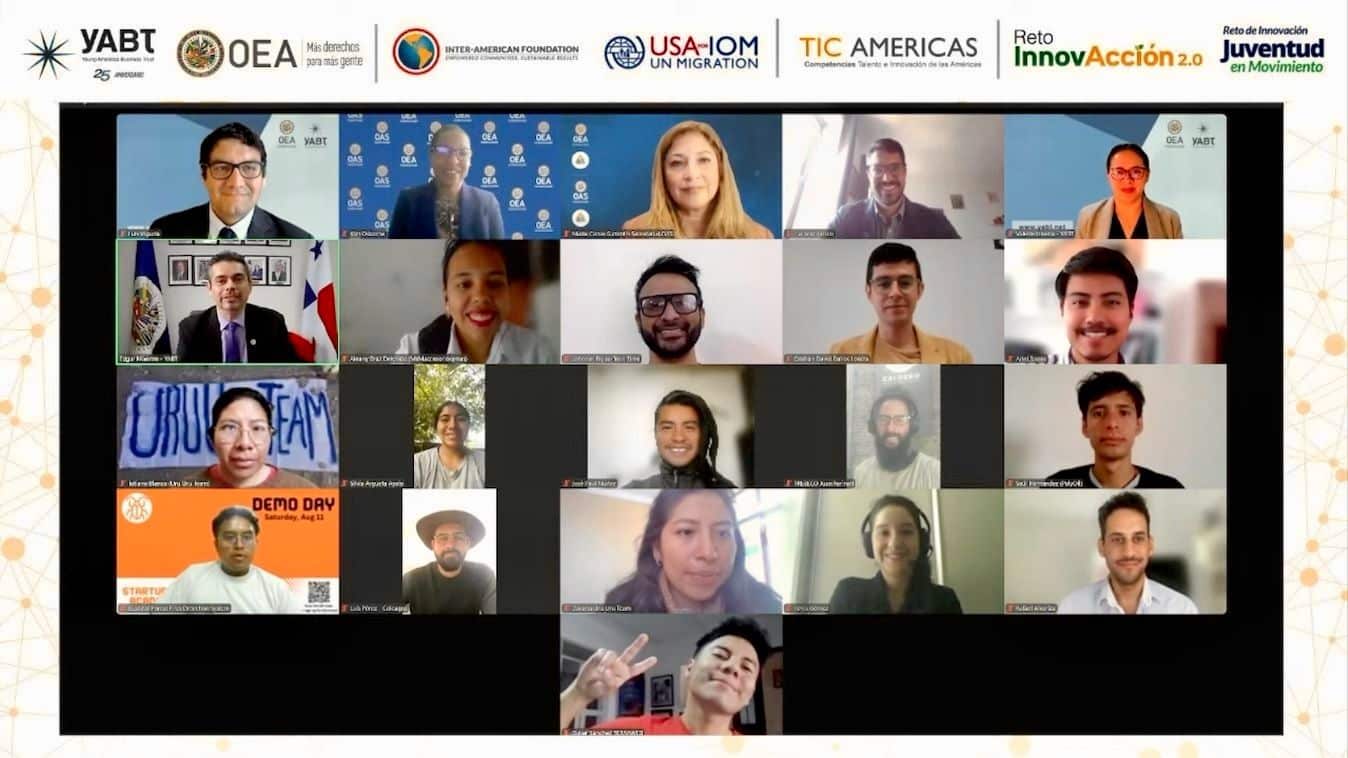
- admin
Regional Youth on the Move Innovation Competition Benefits Migrants and Host Communities in the Americas

Speakers and young entrepreneur finalists of the Youth on the Move and InnovAction Challenge 2.0, during the opening of the Talent and Innovation Competitions of the Americas, held on International Youth Day, August 12, 2024
Finalists of the “Youth on the Move” Innovation Challenge, in Ecuador and Peru, shared the positive impact of their business ventures during the Talent and Innovation Competition Americas 2024. During the live on-line event, finalists expanded upon their pitches in competition for seed capital and further mentoring and support.
The 2024 challenge, which offered start-up and business mentoring and training to hundreds of participants, concluded with a final event held on August 12-13 in commemoration of International Youth Day. The event included expert speakers on sustainability, climate resilience, entrepreneurship and digital transformation.
The Youth on the Move Innovation Challenge is designed to accelerate innovative ideas and new business models that facilitate the socioeconomic integration of migrants. The challenge supports young migrant entrepreneurs to strengthen their businesses and positively impact their communities. The focus is on the integration of Venezuelan migrants residing in Ecuador, Peru and the Dominican Republic.

The competition, organized by Young Americas Business Trust (YABT/OAS), is supported by USA for IOM and the Citi Foundation.
With nearly 700 start-up business submissions from Ecuador, Peru and Dominican Republic, selection of the finalists was highly competitive.
Finalists received $500 USD in-kind support, one month of mentoring, strategic local and regional connections to support their growth, and participation in YABT trainings and events. Together with these benefits, the winner received $2,500 USD seed capital, in-kind support of $1,500, further focused mentoring in the next steps of entrepreneurship, and visibility and follow-up support from YABT.
The finalist businesses included:

Founders of ECOSOS, Gian Walter Arbañil and Ángela Morales engage in sustainable vertical agriculture that empowers Venezuelan migrants and nourishes communities. ECOSOS innovates in food production with aeroponic crops, recirculating irrigation, thereby reducing water usage and eliminating pesticides.
It offers organic, nutritious and chemical-free foods and promotes sustainable business models that integrate Venezuelan migrants through training in agricultural techniques, promoting sustainable business models, benefitting food security and the environment.
Created by Aleany Diaz, MsM Accesories y Más (accessories and more) in Peru is a company that takes responsibility for each accessory they produce. All products are made by hand with hypo-allergic material for any type of body pH, which allows greater durability and lifetime for each piece. The company aims to contribute to the health and well-being of its customers and aims to prioritize socioeconomic integration.


Winner – Tesis Time (Ecuador)
Johnniel Rojas, winner of the Youth on the Move Innovation Challenge, a Venezuelan living in Ecuador, started Tesis Time, Transforming thesis creation around the world. The endeavor aims to improve people’s living conditions by supporting their professional and personal development and their societies, through education and access to employment.
“I came up with the idea to develop an app to learn scientific investigation methodology. We launched the app in Ecuador and later realized this was an issue for people all over Latin America. Our app has been downloaded over 40,000 times in different countries in Latin America. 35,000 students have used our learning methodology, and we’ve helped them graduate and accelerate their degree process, improving their insertion in the job market. Currently, 3,000 students use the app each month. There are over 3,000 hours of content.”
Johnniel explained the concept behind the app: “I was always a slow learner. My mother had a very creative way of helping me study, we would paint, sing, or draw to learn and study. Once I was in college, facing the scientific investigation methodology, I found myself going back to my mother’s empirical methods to be able to understand. This is the base for the teaching methodology of Tesis Time.“
“After launching the app we realized that most of the users were part of vulnerable communities in Latin America. Education is a way to change your reality and climb out of poverty. This has motivated us to develop programs to improve the user’s professional skills. Our next step is creating an educational section on the app where migrants can improve and develop their professional skills in their host communities.”
“Throughout this process, we have seen how each of you has channeled your creativity and passion into projects that not only have the potential to transform your own lives, but also to positively impact your communities and the lives of those who need it most. This journey has not been easy, but your presence here today is a testament to your ability to overcome challenges and turn obstacles into opportunities…”
Luciano Arroio
Interim CEO, USA for IOM

“Together, we can continue to face different challenges to create opportunities and build a better future collectively.” – Valerie Lorena – Executive Director, YABT
The Talent and Innovation Competitions of the Americas (TIC Americas) engages specialists from around the world, who offer knowledge and experience to the entrepreneurial youth of the Americas. The effort connects young entrepreneurs and national and regionalorganizations into a community of actors supporting youth development and exchange, to generate an entrepreneurial spirit and foster innovation and leadership in young people. For the 2024 trainings YABT joined the efforts of InnovAcción and Youth on the Move, to provide a wider breadth of resources.
The program involved multiple on-line bootcamp entrepreneurship training sessions, including:
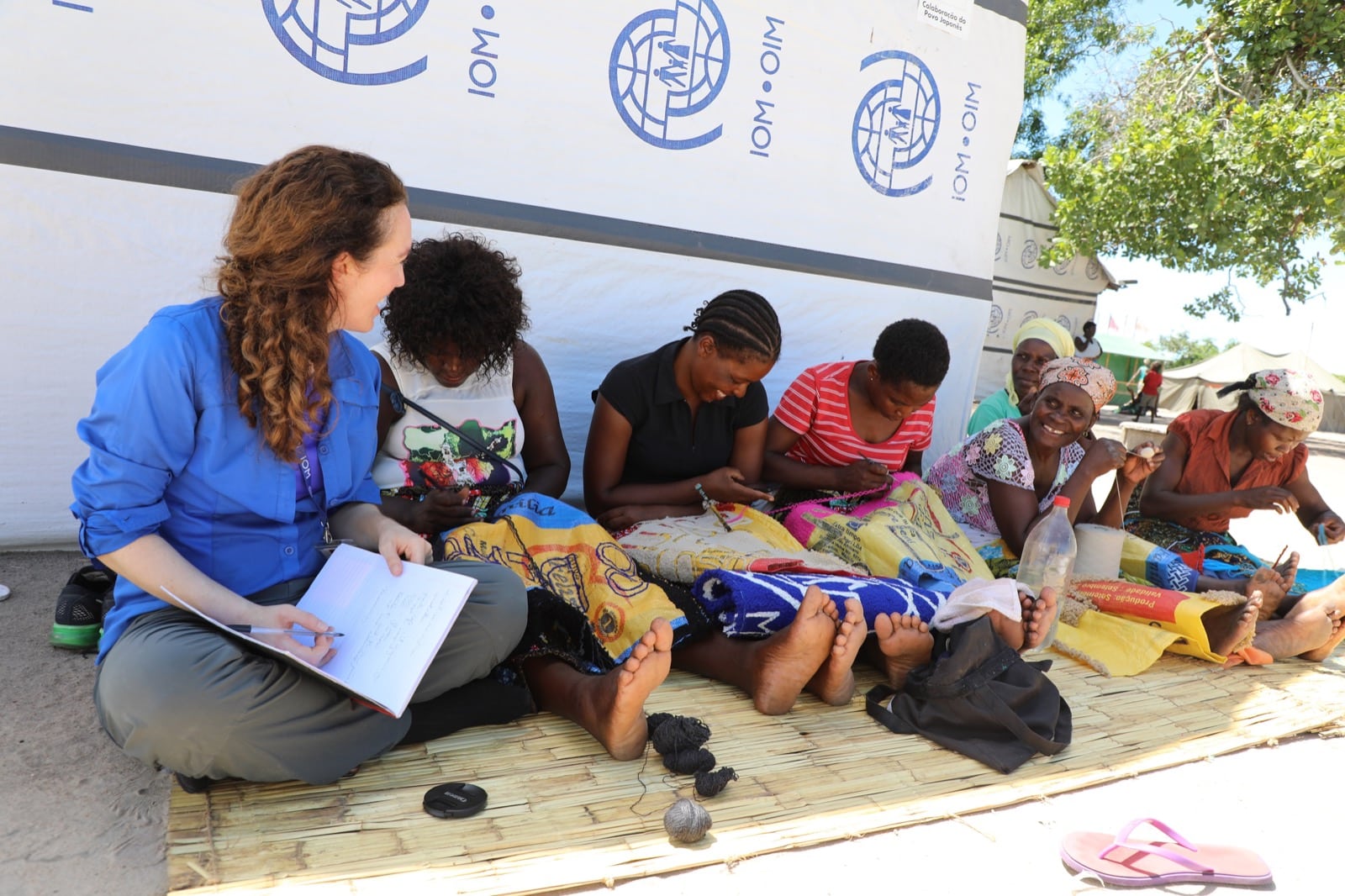
Six Steps to Commemorate World Humanitarian Day
- Sandra Black
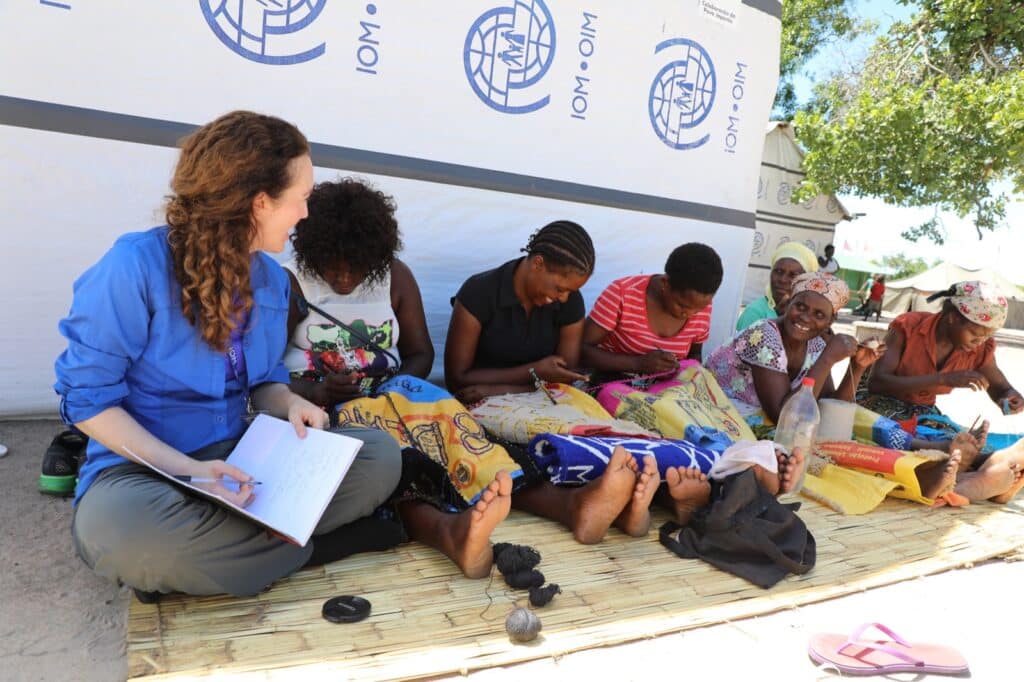
Sandra Black interviews livelihood project participants at displacement site in Central Mozambique.
Six Steps to Commemorate World Humanitarian Day
Anniversaries are a time for both celebration and reflection. World Humanitarian Day 2023 marks 20 years since the attack on UN Headquarters in Baghdad, Iraq. This 19 August, USA for IOM honors those who we work with to meet humanitarian needs globally, #NoMatterWhat.
Echos of the Baghdad bombing persisted when I began working at IOM Iraq in 2014. As a communications officer, my role was to bring attention and expand resources to crisis situations. I share this story, on this day, not only to stand with my fallen colleagues, but also to remind everyone how they can stand with humanitarian workers worldwide.
Recognize the challenges
What does it mean to work in conflict situations, natural disasters and post-conflict zones? I remember from my time in Iraq and Central African Republic.
- – The bullet holes in the car door of the mission I had originally planned to join;
- – A week spent indoors to avoid violent protests, and calling home to say, “Yes Mom, everything’s fine.”;
- – Being called on a Wednesday; Could I depart for another continent’s disaster zone by Friday? Yes, of course.
The humanitarian field experience demands working at full-speed on life-saving tasks, often with intermittent internet and electricity. In most cases as humanitarian workers we have adequate shelter, food, employment, and an organization looking out for us. However, we are faced with daily reminders that those who we support may have lost these entitlements. This work is a labor of love and an exercise in actionable compassion.
- Recognize the needs.
When humanitarian organizations say, ‘resources are stretched’, it’s true. We witness those needs in the faces of people in need, who must stand aside humanitarian distribution lines that can only provide for those in greatest need. And even for those who do receive assistance, a displaced grandmother and grandchild whom I met, the resources provided may not even be sufficient for them to set up an adequate shelter. During crisis a full range of assistance is required.
I recall one occasion, at a food distribution for displaced families cornered in a conflict zone, supplies were inadequate. A displaced woman looked at me and said, “If this is the best you can do, we thank you. Is this the best you can do?” Humanitarian resources can rarely provide for all those in need. These situations are painful and uncomfortable for humanitarian workers.
- Uphold compassion.
In conflict-affected areas, stories shared by displaced families followed a pattern: hearing explosions, fleeing home, surviving in displacement. As displacement figures climb into the millions, the challenge is to not let our compassion fatigue. How do we uphold compassion? By recognizing individuals and their humanity.
I remember the grateful smiles of displaced individuals who were provided with transportation to reunite with family. And the women in Mozambique, rescued from floods by boat and helicopter, who sang in the bus on the way back home; their joy was contagious.
- Encourage and invest in staff.
Well-run humanitarian efforts require investment. Staff training and adequate supplies and preparation are essential.
I remember the Chadian staff member with whom I fled an explosion that targeted the displaced people we were assisting. He was faster than me, but he maintained my pace and held my hand as we ran. Our efforts only succeed when staff are given the support they need, just as he gave me support that day.
- Remember colleagues.
I salute my colleagues who are working in crisis zones, including Ukraine, Sudan, and Democratic Republic of the Congo. “I simply couldn’t remain passive… I wanted to join a humanitarian mission and contribute my best to aid Ukraine,” said Mykyta, an IOM Ukraine non-food item team member.
Humanitarian workers are there to serve, despite and because of the risks that are putting other human beings in danger.
This World Humanitarian Day we keenly remember those whose lives were lost in humanitarian service. We honor their memory with determination to provide enhanced support in times of crisis.
- Support the cause.
I remember the pride of displaced women in Iraq who used donated equipment to set up hair salons to support their families. In visiting refugee camps and displacement sites I consistently encountered nice, normal people who just happened to have been forced to flee their homes. People who aim to improve their situation, and who can rebuild their lives and thrive when provided with adequate assistance.
The theme of World Humanitarian Day 2023 is: ‘No Matter What’. No matter the danger, the hardship, the hostilities… what matters is that we make a difference.
Following several years working in crisis contexts, I am now supporting USA for IOM, continuing to bring attention and resources to IOM’s humanitarian work. I am proud of the spirit of philanthropy in my home country, the United States, and the support offered to those in crisis. Please join humanitarians in standing shoulder to shoulder with the communities we serve #NoMatterWhat.
About the author
Sandra Black has worked for UN Agencies and humanitarian organizations in Iraq, Timor-Leste, Central African Republic, Mozambique, Senegal and Brazil. She is now the Lead Communications Officer with USA for IOM, the non-profit partner in the US of the International Organization for Migration (IOM).

- Stacey Cohan
International Day of UN Peacekeepers: People. Peace. Progress. The Power of Partnerships
Each year on May 29th the United Nations honors UN Peacekeepers. This year, the UN marks the occasion under the theme “People Peace Progress: The Power of Partnerships.” USA for IOM honors those partnerships in highlighting the IOM Kenya’s peace building programs in Mombasa.

In March, USA for IOM visited the Kadzandani ICT Hub in a Mombasa sub-county. IOM began supporting the center in 2021 through the “contributing to sustainable peace” program. The goal is simple: give young people options and opportunities to prevent them from joining drug gangs or extremist groups. Through a partnership with Family Health Options Kenya, young people are taught life skills as they are mentored for the job market. Artistic talents flourish with audio/visual training and performances. The center is a safe space and has connected youth and parents with a path away from the false promise of easy money from gang recruiters.
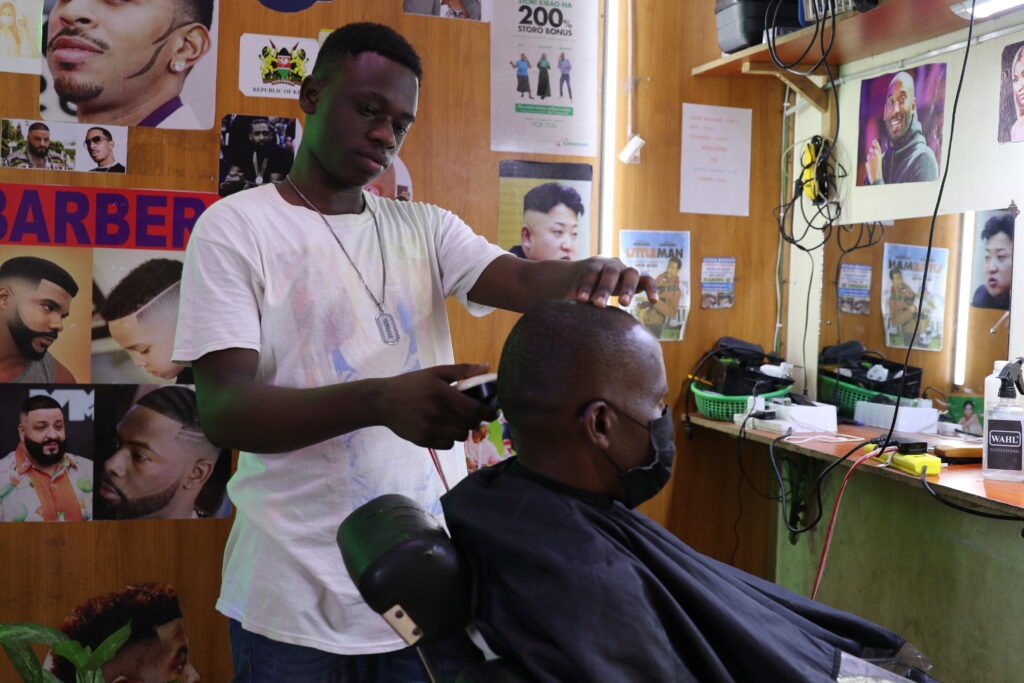
In a more urban part of Mombasa, IOM established the Majengo Yourh Resource Center in 2016 with the support of the German government, The Kenyan Government considers Majengo a hot spot for youth radicalization and recruitment by the violent extremist group Al-Shabaab. Local youth are trained in beauty, tailoring and computer skills. It is a fully operational center providing real services to the community while giving young people work experience and options for their future. The result is fewer young people joining gangs.
This May 29th, USA for IOM celebrates the power of collaboration between civil society organizations, local government, clergy, grassroots initiatives, and IOM. Today, we thank all those who work with us in the pursuit of peace.
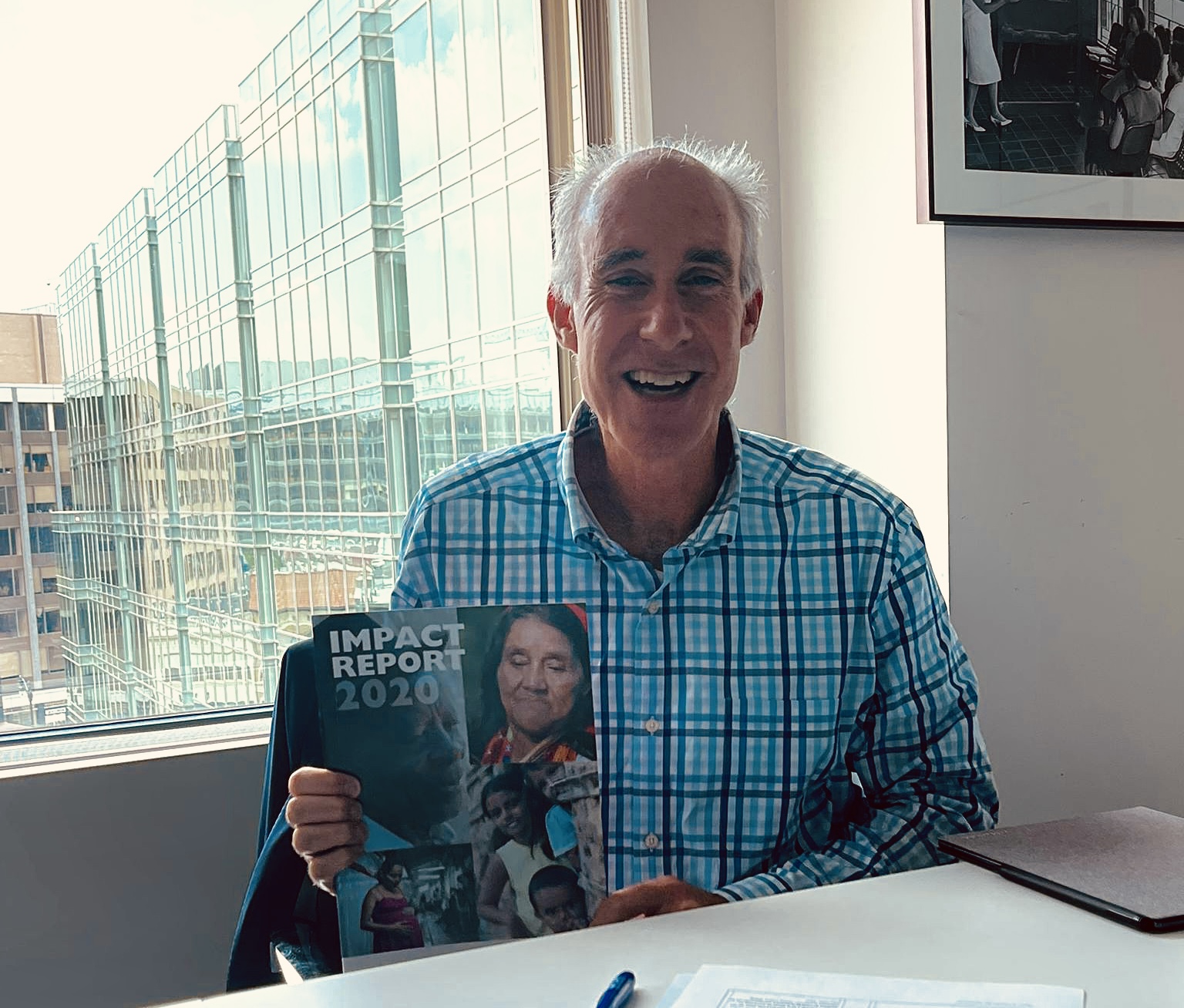
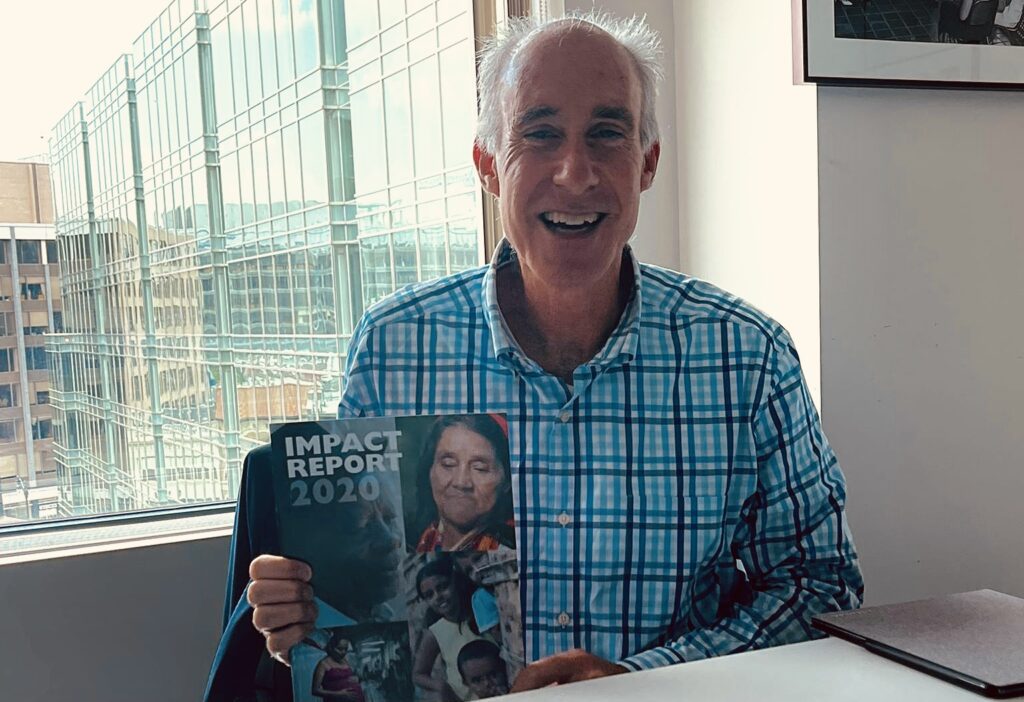
Photo Credit: Maria Moreno
- admin
USA for IOM recognizes the Shapiro Foundation for World Humanitarian Day
Last Month, Ed Shapiro, safely, joined us for our first in-person partner meeting since the outbreak of COVID-19. We were able to share a hard copy of our 2020 Impact Report with him as well as provide an update on the meaningful work he and his network support with their contributions.
The Shapiro Foundation, founded by Ed and his family after retiring from his 27-year career in investment management, almost exclusively concentrates on refugees and immigration. Ed’s personal experiences, passion, and ambition led him to take a deep dive in understanding the history, causes, impacts of, and responses to migration with the desire to identify and support “win-win” opportunities for bottom-up, community-sponsored support of refugees and migrants.
His foundation is an example of one of the four main partner categories USA for IOM engages within the US private sector—individuals, diaspora organizations, corporations, and foundations. USA for IOM considers the Shapiro Foundation to be a remarkable and valuable partnership because the Shapiros see themselves as humans helping humans in an interconnected world with shared values.
The Shapiro Foundation has partnered with USA for IOM and IOM by assisting in the reunification of Central American minors from El Salvador, Honduras, and Guatemala with their families in the United States. The Shapiro Foundation’s partnership stepped in at a time of great need for these families.
2020, however, brought us the COVID-19 pandemic and, over a year later with uncertainty still brewing, the world is undoubtably changed forever. The challenges, losses, and crises shared globally has led to a world with a greater of understanding of just how interconnected we really are— few can say they are personally unimpacted.
For the families awaiting the day when they would be reunited, COVID-19 brought border closures, safety measures, and restrictions in response to COVID-19. These measures necessary for containing the spread of the novel virus also posed unexpected challenges and delays for these families’ reunification with their loved one. In times like these, the value of partners with passion, understanding, and creativity shines even brighter. The Shapiro Foundation adapted the original plan to accommodate the challenges specific to COVID-19.
Our partners, like Ed Shapiro, are one of the most worthwhile and meaningful examples of how people help people. In recognition of World Humanitarian Day, we are honored to feature Ed Shapiro, his family, and the Shapiro Foundation’s passion, ambition, and meaningful efforts for the most vulnerable refugees and migrants.

World Humanitarian Day 2021

- admin
I know I’m not alone when I say that this week has been a heavy one. Leading up to this year’s #worldhumanitarianday, and in the wake of recent events in Haiti and Afghanistan, USA for IOM team and I have been reflecting on how fundraising can enhance its impact through proactive, sustainable investment in development.
It is important to note that while last week’s events were sudden, they were not entirely unpredictable. Sitting on a fault-line in the Caribbean, #Haiti is vulnerable to disasters. What makes this event truly devastating is the underlying social and economic instability that will, in all likelihood, prevent a speedy recovery. We are deploying trucks with food and tents to communities still struggling to recover from the devastating 2010 earthquake. And the myriad challenges facing #Afghanistan, which has suffered governance, socio-economic, and development challenges as a result of decades of conflict, are similarly structural and historic.
In responding to these crises, I often feel we are putting bandages on bullet holes. We can take comfort in the Talmudic proverb, “whoever saves one life, saves the world entire,” I feel as though launching emergency relief responses to predictable crises reveals the Sisyphus complex of the philanthropic sector.
To break free from this cycle, we in philanthropy must be proactive and truly start to use our platform and our tools to engender a world that is not less prone to crises, but one with the social and economic fortitude to be more resilient to them. We must focus on the transformation the world needs beyond the crisis du jour and then focus our resources on proactive solutions.
In a way, this also helps answer another question: how do we prioritize emergency responses? When disaster strikes it’s easy to mobilize action for a cause. But once the faces of distant suffering fade from the frontpages, action too begins to wane. In the past I’ve found myself reaching for a bigger, louder bullhorn, feeling the need to scream “look over here, look over there, we still need you here!”
I believe that by shifting philanthropy to focus on addressing the roots of an issue—the systemic challenges that underpin human suffering–we can avoid the pressure to see humanitarian needs as competing, and instead view them as simultaneous. If funders make not only deep but longstanding investments in a cause or region maybe it will relieve the anxiety the fundraising community feels to fight for attention. Moving forward, I want to learn how I, my team as agents to support development and human mobility, can cultivate and encourage that level of donor dedication long before the needs are urgent.
I encourage comments on: How can philanthropy transform our world? What’s the strategy to this game of whack-a-mole? Is it possible to “care” about everything all at once? And how can we translate care into effective, sustained action? #philanthropy





